Found an old tea container that’s way past the date on the label? That’s when you ask: does tea expire?
Tea doesn’t go bad the way most food products do, but it doesn’t keep quality forever either.
The longer it sits in storage and the worse the conditions, the greater the chances of your tea tasting meh.
Want to learn a thing or two about the shelf life, expiration, and storage of tea? This guide is for you.
I wrote this piece for the everyday tea drinker (like myself), not a tea connoisseur (let alone a tea snob). If you belong to the latter group, there are articles out there that cover these topics in much more detail.
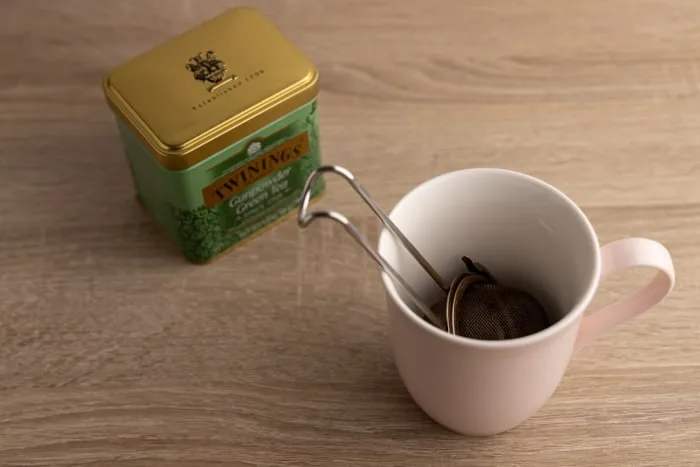
How Long Does Tea Last?
Tea usually retains quality for at least 2 to 4 months past the date on the label, assuming that you store it properly. And loose leaf tea typically keeps its flavor for longer than tea bags, because the surface area of the leaves is smaller.
Besides that, the actual shelf life also heavily depends on personal preferences.
In short, the more important the taste of your tea is to you, the sooner you should use it. Or the higher quality tea you should buy, as that too plays a role in the equation.
Those are the basics. Time to put some meat on the bones.
Black vs. Green vs. Oolong vs. White
Black teas tend to keep fresh for longer than white and green teas, and oolong is somewhere in between.
That’s because the more fermented and intact the leaves, the longer they retain flavor.
In case you didn’t know, all popular teas come from one plant: Camellia sinensis. And whether those leaves end up as black, green, white, or oolong tea depends on the processing after harvest.
Those differences between categories are also noticeable if you compare dates on various teas in the supermarket. For example, black teas come with a shelf life of about 12 to 24 months, while green and white teas have much shorter ones between 9 to 12 months.
You don’t need to run around with a reference card, though.
All you need to remember is that tea should taste fine for at least a couple of months past its date, and know how to tell if yours is fresh or not (more on that later).
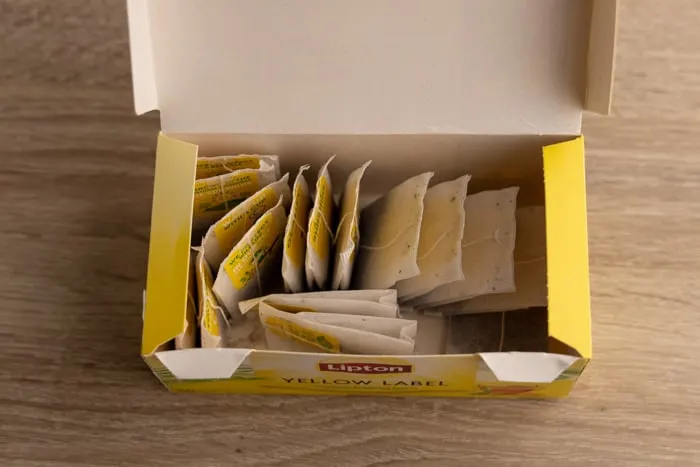
Tea Bags vs. Leaves
Tea leaves can be separated into whole leaves, broken leaves, fannings (small pieces of leaves), and dust. The first two are much larger than the latter two.
As I mentioned in the previous section, the more intact the leaves, the longer they last. That brings us to the difference between tea bags and loose leaf tea.
While containers of loose leaf tea contain mostly whole and broken leaves, tea bags usually are filled with fannings and dust. Of course, some tea bags (usually those pyramid-shaped ones) include whole and broken leaves, but those are the minority.
If you combine those two facts (intact leaves last longer and are usually only found in loose leaf tea), it’s clear that tea leaves tend to retain flavor better than tea bags.
The same is true for coffee: coffee beans keep quality for much longer than grounds.
Small size tea grades (fannings and dust) aren’t necessarily worse (quality-wise) than large ones. Furthermore, these tend to yield stronger brews because of better flavor extraction (due to large surface area). So if you like your tea strong, tea bags are the way to go.
Packaging
Some tea cartons come in plastic wrapping. Sometimes even the individual tea bags are wrapped. There’s a reason for that.
That plastic is there to preserve the freshness of tea by protecting it from oxygen, moisture, and any strong smells.
Because of that, those plastic-wrapped containers or bags tend to retain quality for months longer than ones that aren’t, like tea bags in unwrapped carton boxes. And that their flavor starts to decline only after you remove the wrap.
Moreover, individual wrapping is pretty much a must in any box containing more than one tea flavor. Otherwise, all the smells and tastes would blend into an off-tasting mix.
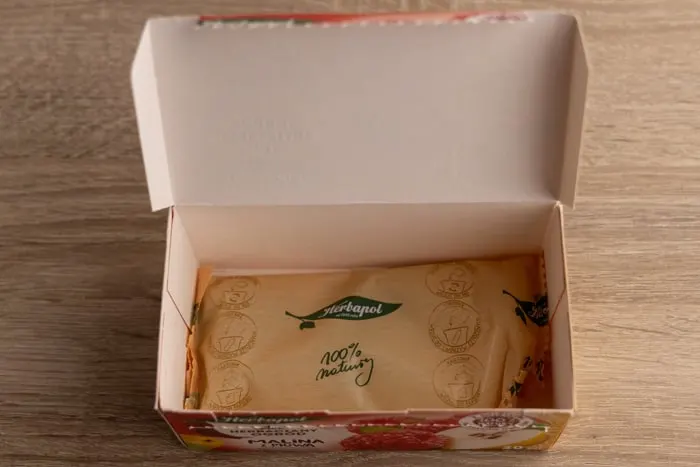
Teas and Infusions With Fruits or Nuts
While most regular teas last for a year or longer, there are also more fancy products that include fruits or even nuts. Those often come with a much shorter shelf life, like 6 months or even less.
If you’re into flavored and spiced teas, always read the label to learn how long that particular blend is good for.
Of course, it’s not like that tea will go stale or taste completely bland a few days past that date, but you should expect it to lose quality noticeably faster than “regular” tea.
Does Tea Actually Expire?
Tea doesn’t really expire, but it loses its freshness and flavor eventually.
You can safely assume that tea that’s a couple of months after its date should taste just fine. But if it’s a couple of years instead of months, it’ll probably taste pretty bland after brewing.
Unfortunately, longer steeping times don’t really help if you’re working with old tea – you cannot extract the flavor that’s not there anymore.
As I mentioned earlier, it’s impossible to tell how long past the “expiration” date on the label you will still find the tea acceptable. It pretty much depends on your taste buds and if you’re drinking tea for its flavor, or just to drink something that isn’t water.
Knowing all of that, let’s talk about how you can check if your tea bags or leaves are still worth anything.
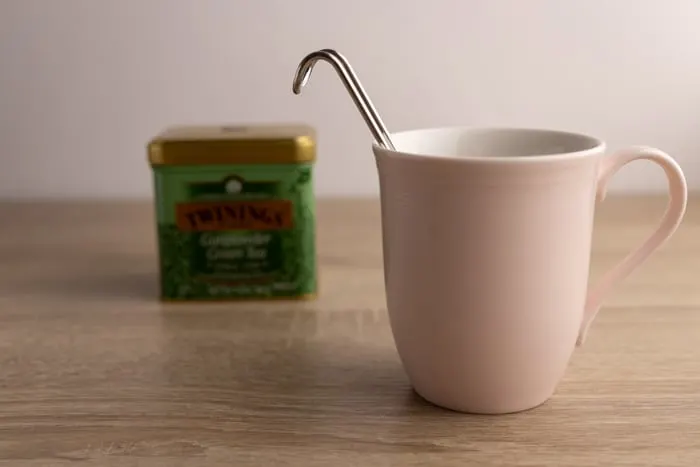
How to Tell if Tea Is Fresh?
There are two steps to check if your bags or leaves are okay to use.
First, you check the dry tea to make sure it’s safe to eat. Second, you brew a cup and taste it.
That’s the bird’s eye view. Let’s talk about the details.
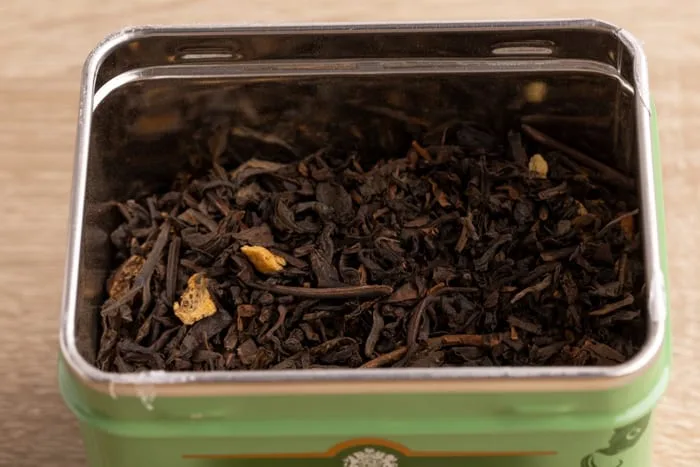
Checking Tea Bags or Leaves
When checking your tea, look for the following:
- Pantry pests. If there are any inside the box, the compost bin is where the tea belongs.
- Mold and any other obvious signs of spoilage.
- Moldy or off aroma. If that’s the case, throw it out.
- Funky smell. If your tea is open for more than a few months, it’s possible that it picked up some strong smells. If that’s the case, you can still brew it, but most likely, it will taste pretty bad.
If everything about the bags or leaves seems okay, boil some water and prep that tea.
Brewing the Tea
This step is pretty straightforward.
Brew that cup and drink a sip or two.
If it’s good enough for you, feel free to continue using that tea, even if it’s way past the date on the label.
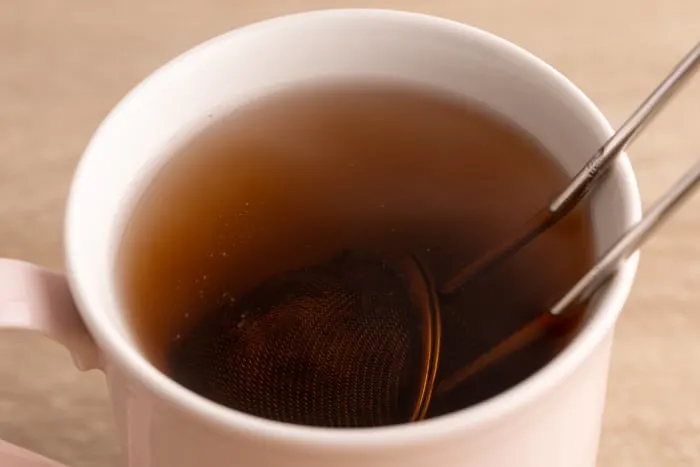
How to Store Tea
Store your tea in a cool and dark place, away from any strong smells and sealed tightly. That’s pretty much all you need for your tea to last as long as it can.
There are a few things to keep in mind here.
Want to learn more about how different storage methods affect tea? Here’s a video in which Don from Mei Leaf talks about an 8-month test he ran. He basically checked if all the standard advice regarding tea storage is correct and how much messing things up affects the leaves.
Adulteration
Tea readily absorbs aromas. That means if its container or box isn’t sealed tightly, the bags or leaves will start to smell funky eventually.
Because of that, you shouldn’t store tea near any strong smells, like in the same cupboard you keep your spices.
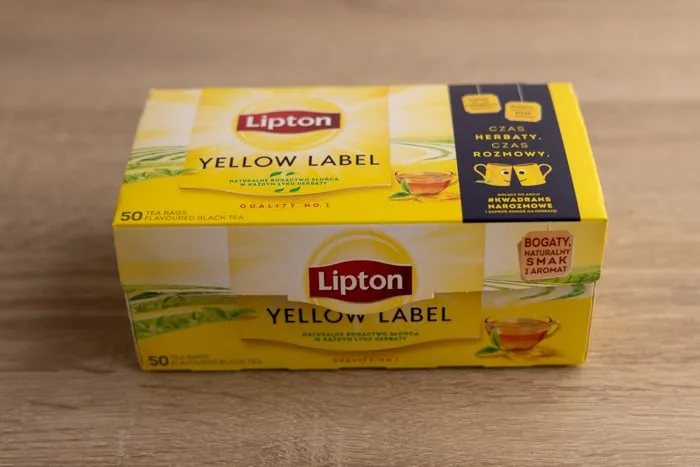
Sunlight Degrades Tea Faster Than Oxygen
Photodegradation has a stronger effect on the flavor of tea than access to fresh air.
That’s why storing your tea in a carton box, which definitely isn’t airtight, isn’t a big deal. As long as there aren’t any strong smells or moisture (near the sink, over the stove) nearby, of course.
If you want to store your tea on display, feel free to use one of those fancy tea containers. Just make sure whatever you use isn’t transparent.
Refrigerating or Freezing Tea Is Tricky
If you want to keep your tea fresh for longer, refrigerating or freezing it is a possibility.
Yup, I don’t know anyone who does that either.
But if you want to experiment with low-temperature storage, make sure your container is airtight and sealed properly. A carton box won’t cut it.
Tea absorbs moisture that’s in the air, so placing it unprotected in a humid environment (fridge or freezer) is a bad idea.
Generally, I suggest you follow Don’s advice and don’t ever refrigerate tea. There’s not that much benefit to it, and it’s easy to mess it up.